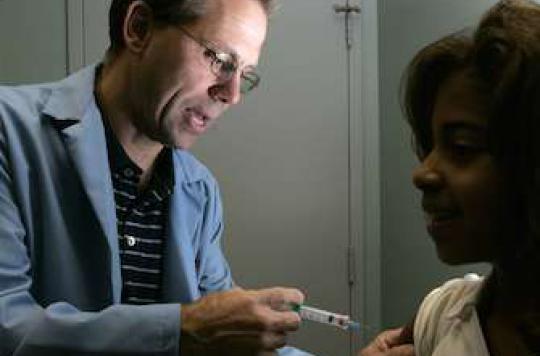Getting vaccinated against papillomavirus does not promote risky sexual behavior. This is the conclusion of a study carried out on 200,000 adolescent girls, vaccinated or not.

“There is no association between vaccination and unsafe sex. »Seth Seabury, of the University of Southern California (United States) publishes, in the JAMA Internal Medicine, the results of monitoring more than 200,000 young girls. The doctor and his colleagues observed the impact of a vaccination against the papillomavirus and the occurrence of sexually transmitted infections (STIs).
An increase with or without vaccine
“If vaccinating girls against HPV resulted in an increase in risky sexual behavior, we would expect to see a greater increase in STI rates in the quarter following the administration of the vaccine,” postulates Seth Seabury. To verify this hypothesis, two teams from the University of Southern California and Harvard School of Medicine (Boston, Massachussetts, United States) recruited 21,000 young girls (12-18 years old) who were vaccinated. against human papillomavirus (HPV) and 186,000 who did not want it. The rate of sexually transmitted infections was measured every three months.
In the group of young girls vaccinated, before vaccination, the rate of STI was slightly higher than that of the control group: 4.3 cases per 1000 participants, against 2.8. Perhaps, according to the researchers, because the teenage girls who decided to be vaccinated were sexually active earlier. But the rate of increase in STIs during the year following vaccination was not significantly different between the two groups: we go to 6.8 STIs per 1,000 young girls in the vaccination group, 4.2 to 1 000 young girls in the control group. It is therefore impossible to link the vaccine to an increase in risky behavior.
Identify the brakes
The two anti-HPV vaccines (Cervarix, Gardasil) prevent cervical cancer. The second also protects against genital warts, anal cancer but also cancer of the vulva or vagina. However, they are not widely used. “Since this is one of the few drugs ever developed that can actually prevent cancer, it is good to be able to reassure parents, doctors and policy makers that the vaccine does not promote sexual practices. at risk in girls and young women, ”concludes Anupam Jena, co-author of the study.
In a commentary associated with the study, Robert Bednarczyk, from Emory University in Atlanta (Georgia, United States) stresses the importance of identifying the obstacles to vaccination. In Australia, where it is compulsory and carried out in school, 80% of adolescent girls receive at least one dose. This is not the case in France, which is struggling to reach 30% vaccine coverage. “Just as we do not wait to have been in the sun for two hours to put on sunscreen, we should not wait to be sexually active to try to prevent infection by papillomavirus”, concludes the scientist.
.

















